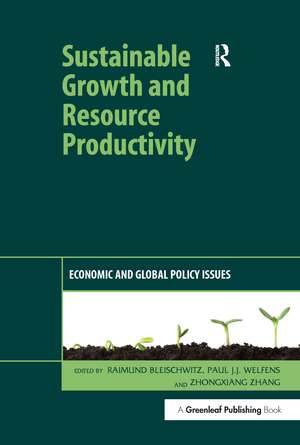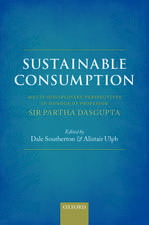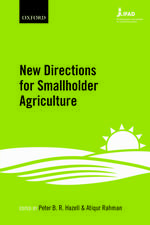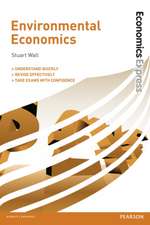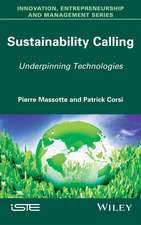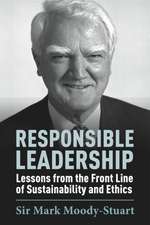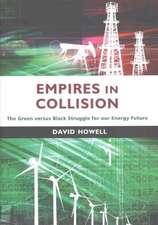Sustainable Growth and Resource Productivity: Economic and Global Policy Issues
Editat de Raimund Bleischwitz, Paul Welfens, ZhongXiang Zhangen Limba Engleză Hardback – sep 2009
Preț: 1225.18 lei
Preț vechi: 1494.12 lei
-18% Nou
Puncte Express: 1838
Preț estimativ în valută:
234.46€ • 254.60$ • 196.95£
234.46€ • 254.60$ • 196.95£
Carte tipărită la comandă
Livrare economică 23 aprilie-07 mai
Preluare comenzi: 021 569.72.76
Specificații
ISBN-13: 9781906093280
ISBN-10: 1906093288
Pagini: 366
Dimensiuni: 156 x 234 mm
Greutate: 0.66 kg
Ediția:New.
Editura: Taylor & Francis
Colecția Routledge
Locul publicării:Oxford, United Kingdom
ISBN-10: 1906093288
Pagini: 366
Dimensiuni: 156 x 234 mm
Greutate: 0.66 kg
Ediția:New.
Editura: Taylor & Francis
Colecția Routledge
Locul publicării:Oxford, United Kingdom
Public țintă
PostgraduateCuprins
Introduction Raimund Bleischwitz, Wuppertal Institute, Germany, Paul J.J. Welfens, European Institute for International Economic Relations, Wuppertal (EIIW) and University of Wuppertal, Germany, and ZhongXiang Zhang, East-West Center, Honolulu, USA Part I: Raw materials supply and resource use from a global perspective1. Will the mining industry meet global need for metals? Magnus Ericsson, Raw Materials Group (RMG), Stockholm, Sweden 2. Global resource use in a business-as-usual world up to 2030: Updated results from the GINFORS model Christian Lutz, Gesellschaft für Wirtschaftliche Strukturforschung (GWS), Osnabrück, Germany, and Stefan Giljum, Sustainable Europe Research Institute (SERI), Vienna, Austria 3. Development and growth in mineral-rich countries Thorvaldur Gylfason, University of Iceland, CEPR, and CESifo, Iceland 4. The physical dimension of international trade 1962–2005: Empirical findings and tentative conclusions Monika Dittrich, University of Cologne and Wuppertal Institute, Germany 5. Defining critical materials Thomas E. Graedel, School of Forestry and Environmental Studies, Yale University, USA Part II: The economics of resources and sustainable growth6. Explaining oil price dynamics Paul J.J. Welfens, European Institute for International Economic Relations, Wuppertal (EIIW) and University of Wuppertal, Germany 7. Technological catch-up or resource rents? A production frontier approach to growth accounting Natalia Merkina, Department of Economics, University of Oslo, Norway 8. Socio-ecological market economy in Europe: Interrelations between resource, labour and capital productivity Erich Hoedl, European Academy of Science and Arts, Austria 9. Why do companies ignore economic efficiency potentials? The need for public efficiency awareness Mario Schmidt, Pforzheim University of Applied Sciences, Germany Part III: Empirical analysis of resource productivity: Trends and drivers10. Decoupling GDP from resource use, resource productivity and competitiveness: a cross-country comparison Sören Steger and Raimund Bleischwitz, Wuppertal Institute, Germany 11. Anxiety and technological change: Explaining the decline of sulphur dioxide emissions in Finland since 1950 Jan Kunnas, European University Institute, Italy, and Timo Myllyntaus, University of Turku, Turun yliopisto, Finland 12. Greece’s fossil fuel use in 2006: A production, consumption and supply-chain analysis Eleni Papathanasopoulou, Sustainable Solutions Greece Part IV: Global policy issues13. China and India’s global demand for resources: Drawing some key implications on international energy security and Africa’s development Jennifer Li, Foundation for Environmental Security and Sustainability, Falls Church (VA) and US Environmental Protection Agency, Washington, DC 14. Asian energy and environmental policy: Promoting growth while preserving the environment ZhongXiang Zhang, East-West Center, Honolulu, USA 15. The rationale for and economic implications of dematerialisation Paul Ekins, King’s College, London, UK Conclusions: Towards a new resource economics Raimund Bleischwitz, Wuppertal Institute, Germany, Paul J.J. Welfens, European Institute for International Economic Relations, Wuppertal (EIIW) and University of Wuppertal, Germany, and ZhongXiang Zhang, East-West Center, Honolulu, USA
Notă biografică
Raimund Bleischwitz, Paul Welfens, ZhongXiang Zhang
Descriere
Presents an overview of global issues of raw materials supply and resource use. This book also introduces views and perspectives on the sustainable growth of emerging economies and develops a rationale for resource economics.
